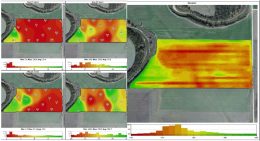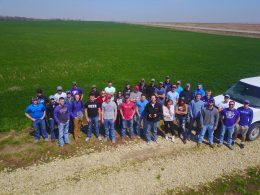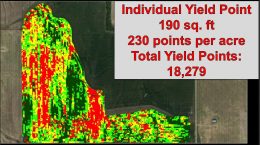We are excited to announce a new option, Precision Agriculture, has been approved by Kansas State University to the Agronomy major.

Students can now choose to enroll in the following options within Agronomy:
- Business and Industry
- Consulting and Production
- Plant Science and Biotechnology
- Precision Agriculture
- Range Management
- Soil and Environmental Science
This is the first new option added to the Agronomy curriculum in many years, and is in response to demand from employers and students, says Mickey Ransom, Agronomy Professor and Assistant Head for Teaching. Getting a new option added to a curriculum is a lengthy and detailed process within the university, but Ransom and Kim Kerschen, Agronomy Instructor and Academic Coordinator, felt strongly that the new option was needed.
“Industry came to us and said they were putting a lot of our recent graduates into precision agriculture work. They wanted to employ graduates who could take all the data being collected by new technology and make agronomic decisions based on that data,” Ransom says.
Until now, students in Agronomy could choose to take existing courses in precision agriculture, while selecting one of the other options within the Agronomy major. Students did not, however, have a way to promote themselves to prospective employers as having a focus and specialty in precision agriculture, Ransom explains.
Some of the courses at K-State and K-State Polytechnic directly related to the Precision Agriculture option within Agronomy include:
AGRON 202 Introduction to Precision Ag Software
AGRON 655 Site Specific Agriculture
ATM 450 Sensors and Controls for Agricultural and Biological Systems
ATM 550 Precision Agriculture Technologies
GEOG 508 Geographic Information Systems I
GEOG 605 Remote Sensing of the Environment
GEOG 608 Geographic Information Systems II
UAS 270 Introduction to Unmanned Aircraft Systems
UAS 373 Small Unmanned Aircraft Design and Construction for Non-Aviators
UAS 463 Introduction for Autopilots and Mission Planning for Non-Aviators
In Agronomy, AGRON 202 was offered for the first time in the Spring semester of 2017, taught by Ray Asebedo, Assistant Professor of Agronomy and Precision Agriculture Specialist. This course was developed to be an introduction to precision agriculture software for any undergraduate students interested in the subject. In its first year, 41 students were enrolled, which was the maximum capacity.

In this course, students learned about mobile, cloud, and desktop GIS software. Emphasis was placed on the basics of data collection, processing, and analytics for the generation of recommendation maps and output files for rate controllers that account for site-specific variation. The goal of this course was to build students to a level of proficiency with GIS software early in their precision agriculture training that would be continually built upon as they go through the precision agriculture program.
Asebedo found the students in AGRON 202 to be thoughtful and creative. They seemed to enjoy the course.
“Learning software is often a struggle for students and can seem a rather daunting task. Often, software courses try to cover too much material and students get lost in the process. Majority of students thought the course was intensive but were pleased at the end of semester as they could build fields, import data such SSURGO, satellite imagery, and drone imagery, and process them to recommendation maps that are high quality on their own,” Asebedo says.
“Many students started doing extra work and building maps for their home farms, and even creating their own logos to mark their work. It was definitely a fun time with these students. We had many late-night ArcMap map making parties. Precision agriculture is an interdisciplinary field requiring students to understand software and hardware as well as the agronomic sciences. Interdisciplinary training is what we seek to provide for generating the next wave of precision agronomists,” Asebedo says.
Overall, the new Precision Agriculture option within the Agronomy major adds visibility and marketability to our undergraduate program, Ransom says. It also helps in recruiting new students. Precision agriculture technology has created fundamental changes within agriculture, and once again K-State and the Department of Agronomy are leaders in the field.
